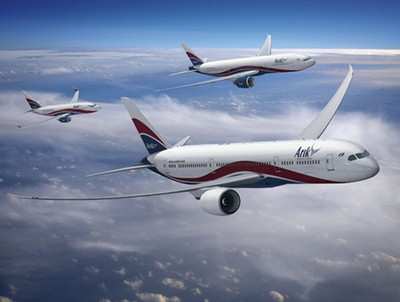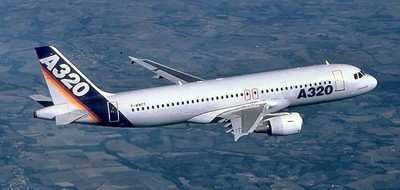They Made The Hay... Now, The Sun Has To Keep Shining
With combined orders of nearly 7,000 aircraft over the past
three years, it's no secret times have been very good to Airbus and
Boeing. Now, the question is whether those record sales will hold
up long enough to translate into deliveries.

The Wall Street Journal reports it's all-but certain some of
those orders won't hold up to become actual aircraft, as it's not
uncommon for customers to back out of aircraft orders. There are
also the carriers that, to be blunt, won't be in business long
enough to take delivery their planes.
The current boom market puts Airbus and Boeing in a tough spot
when it comes to ramping up production to meet the apparent demand.
Boeing, in particular, knows the consequences of increasing
production too quickly, only to have the orders that were to keep
those lines going evaporate. The planemaker suffered just such a
dilemma in the late 1990s... and barely survived.
"In this hot market, it would be easy to be consumed with the
desire to sell anything to people walking through the door who want
to buy and push our production system to the point where you could
break it," said Boeing Commercial Aviation CEO Scott Carson back in
September 2006. "It’s much harder to say, 'I’m sorry,
we’re sold out.'"
Funny thing is, even as both Boeing and Airbus told customers,
essentially, to get in line for 2007... the orders kept coming.
This week, Carson told the WSJ Boeing is continuing to work to
achieve the right balance between increasing production, and
preparing for an uncertain future. "We have been cautious about
taking rates higher in anticipation that there could be a cooling
off," he said Thursday. "That said, we continue to see surprising
strength in the market."
Both planemakers expect the market to cool considerably for
2008, returning to the level of around 500 orders apiece... but
conditions remain optimal for some carriers to buy now. The low
dollar, in particular, is a strong incentive for airlines to lock
in orders (even Airbus, which builds its planes primarily in euros,
sells them in US dollars -- giving airlines extra buying power, at
the expense of the planemaker.)
It's also worth noting both manufacturers predicted 2007 would
be a slow year, compared with 2006... which was supposed to be
slower than 2005. We all know how those predictions turned out.
"My credibility is about zero when it comes to predicting order
numbers," said Carson this week. "But it's got to slow down some
time and we think it's 2008."
Airbus and Boeing do intend to accelerate production rates, and
possibly build new plants, to meet demand -- but only when each is
fairly certain the orders will stick. Given that some of both
companies' largest customers in recent years have been airlines
that didn't even exist five years ago, it's hard to say at this
stage which orders will last, and which will fall.
In such a hot market, "many of these orders never materialize,
but it's impossible to predict which ones those will be," said
Airbus Chief Operating Officer John Leahy, also the planemaker's
top salesman.

Christian McCormick, chief executive of transportation finance
at French bank -- and aircraft financier -- Natixis SA, says both
manufacturers would be wise to wait awhile longer, to determine how
things play out.
"If the manufacturers start increasing production and building
factories to meet all this speculative demand, they'll be in
trouble," said McCormick.
 ANN FAQ: Contributing To Aero-TV
ANN FAQ: Contributing To Aero-TV Aero-News: Quote of the Day (12.10.25)
Aero-News: Quote of the Day (12.10.25) ANN's Daily Aero-Term (12.10.25): North Atlantic High Level Airspace (NAT HLA)
ANN's Daily Aero-Term (12.10.25): North Atlantic High Level Airspace (NAT HLA) Airborne 12.08.25: Samaritans Purse Hijack, FAA Med Relief, China Rocket Fail
Airborne 12.08.25: Samaritans Purse Hijack, FAA Med Relief, China Rocket Fail Airborne-Flight Training 12.04.25: Ldg Fee Danger, Av Mental Health, PC-7 MKX
Airborne-Flight Training 12.04.25: Ldg Fee Danger, Av Mental Health, PC-7 MKX




